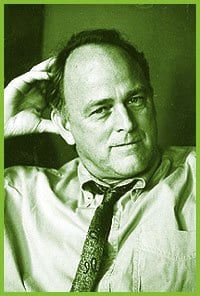Beamish? Vali-quette’s? Cloutier’s? Cohen’s IGA?
Often as I wander along Wellington between Holland and Island Park Drive, I recall the stores that used to be here. But I also remind myself that jazzed-up storefronts can conceal the truth of their history.
Over recent years, I have seen three businesses open – a bookstore, a hair salon and a bakery – which sport rainbow flag decals. Not bad for a relatively small business district. These businesses have remained open which says something about the support they have received.
Is this symptomatic of the gay scene in Ottawa? The gay and lesbian communities in Toronto, Montreal and Vancouver tend to congregate in a concentrated area. Here, it is dispersed, integrated into many neighbourhoods. Or does it suggest people are more comfortable with gays and lesbians living among them?
The newest of the three businesses is the Harvest Loaf, which was opened in Feb, 2000 by Chris Green and Raïssa Couloumbe. The two had run the Boko Café in the Market area from 1996 until 1999 when the recession hit. The Market went from a dynamic, lived-in area to streetscapes of trendy bars and overpriced boutiques.
“The restaurant had come to its natural end,” says Raïssa. “It was a difficult period. Over the three years in the Market, we had built up quite a gay clientele. They had become our friends. They were there for us in that trying time.”
Chris turned to baking, a skill honed in the family’s business in Australia, selling savoury pies to other businesses. Driving up and down this section of Wellington Street, Chris noticed the empty shop and a long line of patrons queuing for the pub upstairs despite a snowstorm. This was taken as a good sign. In the next few weeks, Chris asked people on the streets if they thought the area needed a bakery.
“From day one, the business took off. Ottawa’s a conservative city and yet, when we were renovating, people came into the store, asked what business it would be. This area has a good cross-section of Ottawa’s population. Young couples, singles, elderly people, many of whom have travelled widely or lived in other countries.”
I ask about the rainbow decal. Chris says that the people for whom it is important notice it. Many of their gay clientele, who came to their restaurant, have followed them to the bakery. In addition, gay and lesbian couples in the area have become customers.
“Ottawa’s gay community is a very tight community. People know each other, are connected. When Raïssa and I went down to the Pride party last year, so many of our customers were there.”
I ask if there is a policy to hire gay staff. No, they respond, but they have had gay staff. They laugh.
“In fact, we have had staff whom we knew were gay before they did. We are more concerned that our staff fit in with our approach, share our business and personal ethic.”
Do they consider the bakery a gay-owned business or just gay-friendly, I finally ask?
“We don’t identify either way,” Raïssa adds. “For us it is an non-issue. Our closest friends have been from the gay and lesbian community. The decal is merely a way of thanking them and making them and others feel welcome.
“Our focus is to treat everyone the same. There is no bias. We are an owner-run business. For us, what is most important is the personal touch. We get to know our customers. We are open about the way we feel.”
I suddenly realized I had assumed a rainbow decal was a signal the business was gay-owned.
Raïssa’s response echoed an e-mail I had received from Jordan Kent about whom I wrote in my last column, identifying her as a transsexual.
She identifies as gender queer. Jordan wrote: “It is a shame that in the queer culture, where we pride ourselves so much on our acceptance of diversity, that such misunderstandings should happen. Why we feel it is necessary in the queer world to still try to fit each other into black-and-white boxes (straight ally, gay comrade, transsexual, genetic female) eludes me. My hope is that the next generation will leave all the labels behind. Then we will truly be free to love each other and ourselves.”
I also received a call from Sue Philainen about the column and her wish to be a parent. Although she did attempt to have children through artificial insemination with her previous partner, these sadly did not come full term.
Happily she met her current partner, who had two children. Sue wrote me: “We are now a family and I could not have picked two better kids to call my own. We live in a rural area and people have been decent. They have realized we are like other parents, busy with hockey, horseback riding, homework, laundry and lunches. We have been accepted by the community because we accept the community and we are involved.”

 Why you can trust Xtra
Why you can trust Xtra


